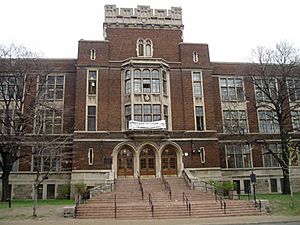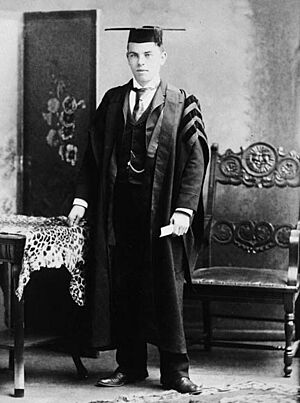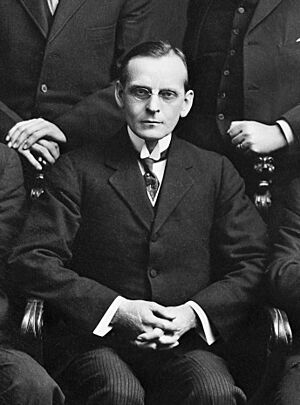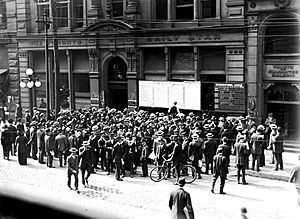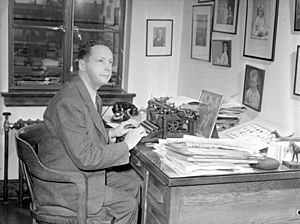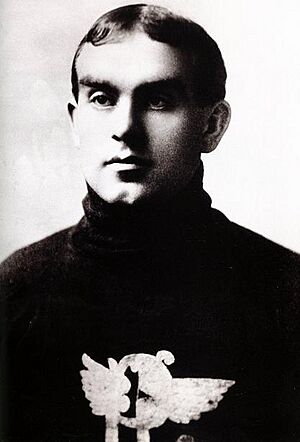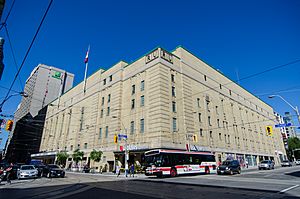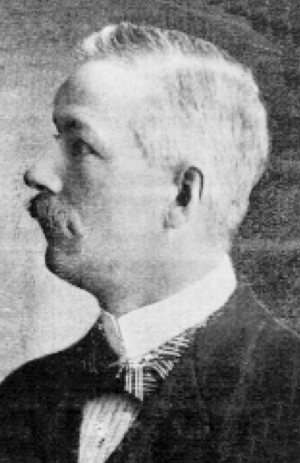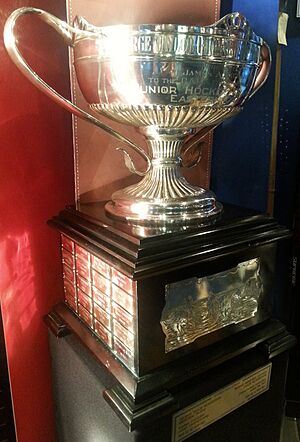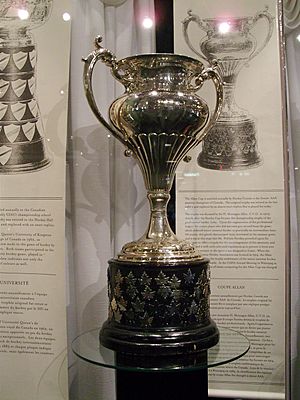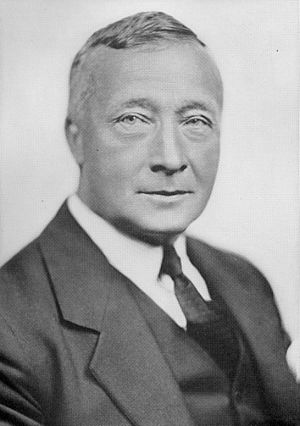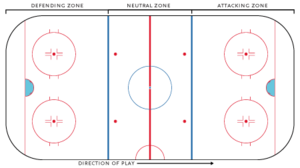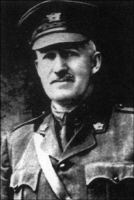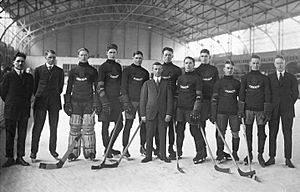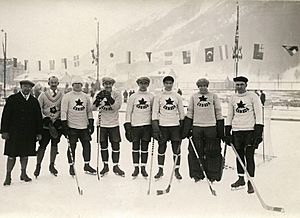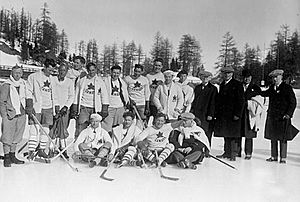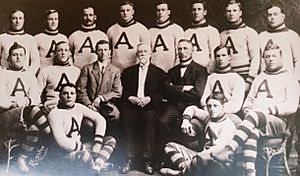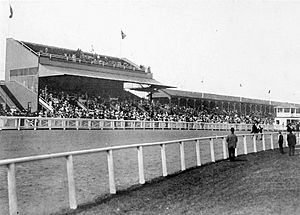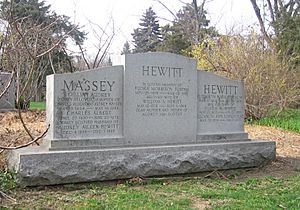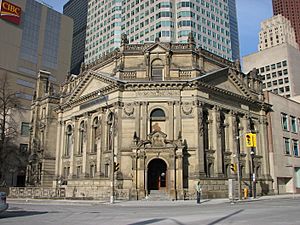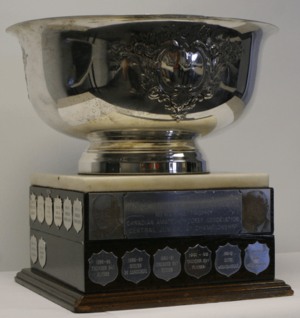W. A. Hewitt facts for kids
Quick facts for kids
W. A. Hewitt
|
|
|---|---|
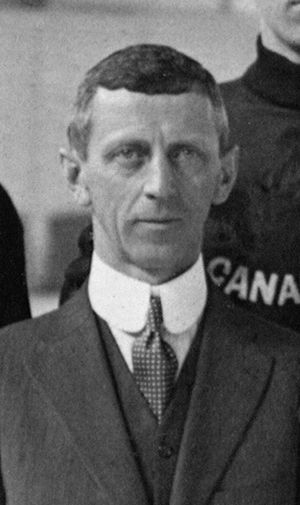 |
|
| Born |
William Abraham Hewitt
May 15, 1875 Cobourg, Ontario, Canada
|
| Died | September 8, 1966 (aged 91) Toronto, Ontario, Canada
|
| Resting place | Mount Pleasant Cemetery, Toronto |
| Known for |
|
| Children | 2, including Foster Hewitt (son) |
| Family | Bill Hewitt (grandson) |
| Awards | |
| Honours | Dudley Hewitt Cup |
William Abraham Hewitt (May 15, 1875 – September 8, 1966) was a very important Canadian sports leader and journalist. Many people knew him as Billy Hewitt. He worked as the secretary for the Ontario Hockey Association (OHA) for a very long time, from 1903 to 1966. He was also the sports editor for the Toronto Daily Star newspaper from 1900 to 1931.
Hewitt helped create the Canadian Amateur Hockey Association (CAHA). He worked there as a secretary and treasurer for many years. He made sure that player registrations were the same across Canada. He also helped make rules for amateur and professional hockey. After leaving journalism, he became the managing-director of Maple Leaf Gardens from 1931 to 1948. He also helped choose the first members for the Hockey Hall of Fame in 1945.
Hewitt was part of the Canadian Olympic Committee from 1920 to 1932. He helped pick athletes for the Olympics. He was even the main leader for Canada at the 1928 Winter Olympics. He managed the money for the Canada men's national ice hockey team when they won Olympic gold medals in 1920, 1924, and 1928. He also helped bring Canadian hockey rules to the world and even refereed the first Olympic ice hockey game.
Contents
Early Life and Family Connections
William Abraham Hewitt was born on May 15, 1875, in Cobourg, Ontario. His family moved to Toronto when he was about four years old. His father passed away when William was only eight.
When he was young, Hewitt was not very big, so he didn't play many team sports. He learned to box from his brothers. At age 12, he helped professional baseball players practice. His first job was selling newspapers. He also sorted apples, worked in a law office, and at a grocery store. He finished high school at Jarvis Collegiate Institute.
Hewitt married Flora Morrison Foster in 1897. They met while singing in their church choir. They had a daughter named Audrey and a son named Foster Hewitt. Foster later became a famous radio sports announcer. William's grandson, Bill Hewitt, also became a sports commentator.
Hewitt's Journalism Career
William Hewitt started working at newspapers when he was just 14 years old. He earned C$4 a week as a copy boy for the Toronto News.
Toronto News Reporter
At age 15, Hewitt started writing for the Toronto News. His first job was reporting on a person in prison. He later covered baseball, lacrosse, and police news. By age 20, he became the sports editor for the Toronto News. He was very good at getting information from his many contacts in the sports world.
Hewitt also helped arrange train trips for fans to go to horse races. He covered city council meetings and the opening of Toronto City Hall in 1899.
Montreal Herald Sports Editor
A publisher named Joseph E. Atkinson asked Hewitt to become the sports editor for the Montreal Herald. Hewitt took the job. He wrote in his memories that he helped introduce nets to hockey goalposts in 1899. This helped solve arguments about whether a goal was scored.
Toronto Daily Star Years
Hewitt returned to Toronto in 1900 and became the sports editor for the Toronto Daily Star. He worked there until 1931. He wanted his sports writers to write articles that were accurate and short. He also wanted them to put the game's result in the first sentence. This made it easier to shorten articles if the newspaper needed more space for ads.
His favorite sports to cover were ice hockey and Canadian football. He also wrote about baseball, boxing, and horse racing. He even reported on a famous boxing match in 1919 where Jack Dempsey won a heavyweight title.
In the early 1900s, Hewitt traveled with the Toronto Maple Leafs baseball team. He also helped run a scoreboard business for the World Series in Toronto theaters. This allowed people to follow games live using telegraph updates.
Hewitt faced some legal issues for publishing horse racing results and forms. In 1910, he was fined for "printing, publishing, and selling a daily racing record." In 1921, he was fined again for publishing a horse racing form.
Hewitt was very interested in connecting newspapers with radio. He helped his son, Foster, start a career in radio. They even broadcast the King's Plate horse race together in 1925, which was the first horse race ever on radio.
Hewitt retired from the Toronto Daily Star in 1931. He always wrote his stories by hand and never used a typewriter.
Leading the Ontario Hockey Association
Hewitt was involved in ice hockey as a player and a referee. He was elected secretary of the Ontario Hockey Association (OHA) on December 8, 1903. He held this important role for many years.
Hewitt, along with other OHA leaders, reviewed protests and suspensions. They were sometimes called the "Three White Czars" because they had so much power. In 1904, Hewitt was involved in a decision that suspended famous player Cyclone Taylor for a season. Taylor never forgave him for it.
Hewitt also made sure that the OHA got its share of money from game tickets during playoffs. Once, he had to get the Premier of Ontario to help him collect money from a rink.
Referees and Hockey Rules
As OHA secretary, Hewitt was like the main referee boss. He scheduled referees for playoff games. He also spoke at meetings to help referees understand new rules and make sure they were fair. He wanted referees to be strict with players who argued or played too rough.
Working with Professional Teams
In 1924, the OHA decided to keep its rule against professional coaches in amateur hockey. Hewitt thought they should allow some professionals, like athletic directors, to be involved. His idea was finally approved a few years later.
Hewitt also helped the OHA get good deals for playing games at arenas. He helped negotiate contracts with Maple Leaf Gardens. He became the managing-director of Maple Leaf Gardens in 1931. He oversaw all events there except hockey games.
Even though he worked for Maple Leaf Gardens, the OHA decided he could still be their secretary. This was because he didn't manage the professional hockey team, the Toronto Maple Leafs.
Later Years at OHA
During World War II, Hewitt helped the OHA raise money for charities to support the war effort. In 1948, the OHA hired an assistant to help Hewitt with his large workload. His role slowly became smaller over the years.
Hewitt was re-elected as OHA secretary for his final term in 1965. He retired in May 1966.
Leading the Canadian Amateur Hockey Association
Hewitt helped create the Canadian Amateur Hockey Association (CAHA) in 1914. This group became the main organization for amateur hockey in Canada.
Secretary and Registrar
Hewitt became the CAHA secretary in 1915. During World War I, he kept the CAHA running by using mail-in votes because meetings were too expensive. He helped organize national playoffs for the Allan Cup, which was for senior hockey champions.
The Memorial Cup was created in 1919 for the junior ice hockey championship. Hewitt helped organize its games and became one of its trustees. In 1921, Hewitt became the CAHA's registrar. He created standard forms for players to register and transfer teams. This helped stop players from moving just for hockey.
Registrar-Treasurer Role
In 1925, Hewitt became the CAHA's registrar-treasurer. This meant he was in charge of both player registrations and the CAHA's money. He became a trustee for the George Richardson Memorial Trophy when it was created in 1932.
During World War II, Hewitt helped the CAHA donate money and buy war bonds to support Canada's war effort. He also helped junior hockey grow.
Player Rules and Transfers
Hewitt worked to make sure players had to live in a certain place to play for a team. This stopped "hockey tourists" who moved just for hockey. He also helped create rules for amateur players who wanted to try out for professional teams.
During World War II, Hewitt made player transfer rules easier because many players joined the military. After the war, he allowed soldiers returning home to join any club.
Allan Cup and Professional Deals
Hewitt helped the CAHA take full control of the Allan Cup in 1928. This gave the CAHA more money from playoff games.
Hewitt also worked with the National Hockey League (NHL) to create agreements between amateur and professional hockey. He met with NHL president Frank Calder many times. They discussed how to keep players in amateur hockey longer and how professional teams could get new players. These agreements helped both amateur and professional hockey grow.
International Hockey Relations
Hewitt helped organize international hockey games. He worked with hockey groups in the United States and Great Britain. He helped create the International Ice Hockey Association during World War II.
Hockey Rules Committee
Hewitt was a key person on the CAHA rules committee. He helped make hockey rules the same across Canada and worked with professional leagues to have common rules.
He helped set the standard weight for hockey pucks. He also helped make rules about body checking and offside. In 1943, the NHL agreed to a CAHA idea to add a center ice red line. This allowed for longer passes and changed how the game was played.
Hewitt worked to make sure referees understood the rules the same way. He wanted to reduce rough play like elbowing and high-sticking.
Hockey Hall of Fame
In 1941, Hewitt helped a committee write a history of hockey in Canada. He was also a main leader in choosing the first people to be inducted into the Hockey Hall of Fame. In 1945, he announced the first group of players and "builders of hockey" who were honored.
Retirement from CAHA
Hewitt retired from his role as registrar-treasurer of the CAHA in 1961 at age 86.
Olympics and Other Sports Leadership
Hewitt was involved in many sports beyond hockey. During World War I, he helped provide sports equipment to soldiers.
Olympic Hockey Success
Hewitt was a leader for Canada's Olympic hockey teams. He managed the money for the Winnipeg Falcons at the 1920 Summer Olympics. He also introduced Canadian hockey rules to the world and refereed the first Olympic hockey game ever played. He even helped pick Canadian boxers for the 1920 Olympics.
He also managed the finances for the Toronto Granites at the 1924 Winter Olympics. He helped find replacement players for the team. The Granites won all their games and took home the gold medal.
Head of Mission in 1928
Hewitt was the main leader for all Canadian athletes at the 1928 Winter Olympics. He organized travel for figure skating, speed skating, skiing, and ice hockey teams. The University of Toronto Graduates hockey team won the gold medal that year without giving up any goals.
Football and Horse Racing Roles
Hewitt was also a football referee and manager in the early 1900s. He managed the Toronto Argonauts football team from 1905 to 1907. He helped create the Inter-provincial Rugby Football Union in 1907, which brought together teams from different provinces.
He was president of the Canadian Rugby Union from 1915 to 1919. He worked to make football rules the same across Canada.
In horse racing, Hewitt was a patrol judge at Woodbine Race Course. He was also a steward for racing associations for many years. He helped investigate and discipline jockeys and trainers. He also helped bring in new rules like medical exams for jockeys and using film to review races.
Personal Life and Legacy
Hewitt lived in Toronto and had a summer home on the Toronto Islands. He often took his family on road trips. He and his son even attended the 1918 World Series.
In 1952, his wife passed away in a car accident, and Hewitt broke both his arms. He later published his memories in a book called Down the Stretch: Recollections of a Pioneer Sportsman and Journalist.
He passed away on September 8, 1966, in Toronto. He is buried with his wife in Mount Pleasant Cemetery, Toronto.
Honors and Awards
Hewitt received many honors for his work in sports. He was made a life member of the OHA in 1925. In 1938, he was honored for his 35 years with the OHA.
In 1945, Hewitt was chosen as one of the first "builders" to be inducted into the Hockey Hall of Fame. He also received the OHA Gold Stick Award in 1947, which is the highest award from the OHA.
In 1953, a big dinner was held to celebrate his 50th anniversary as OHA secretary. He was also made a life member of the CAHA in 1960. In 1966, he was named honorary life secretary of the OHA.
After he passed away, Hewitt was inducted into the IIHF Hall of Fame in 1998 for his contributions to international hockey.
Hewitt's Lasting Impact
Several hockey trophies are named after W. A. Hewitt, including the W. A. Hewitt Trophy for different levels of hockey. The Dudley Hewitt Cup is also named after him and George Dudley. This cup is awarded to the Central Canada Junior A champion team.
Many people credit Hewitt with introducing nets to hockey goalposts in Montreal, though he said the idea came from another journalist.
James T. Sutherland, another important hockey leader, said that the OHA owed most of its success to Hewitt. He called Hewitt a "miracle man of hockey." Journalists described Hewitt as a forward-thinking leader who was dedicated to sports. He was known for his deep knowledge of hockey and horse racing.
Images for kids
 | James B. Knighten |
 | Azellia White |
 | Willa Brown |


